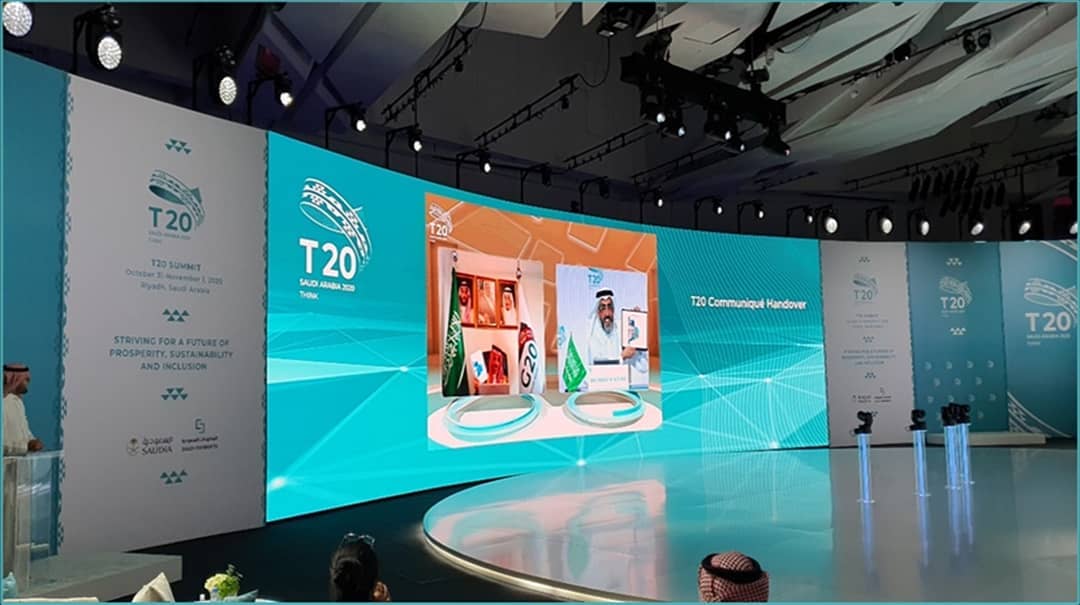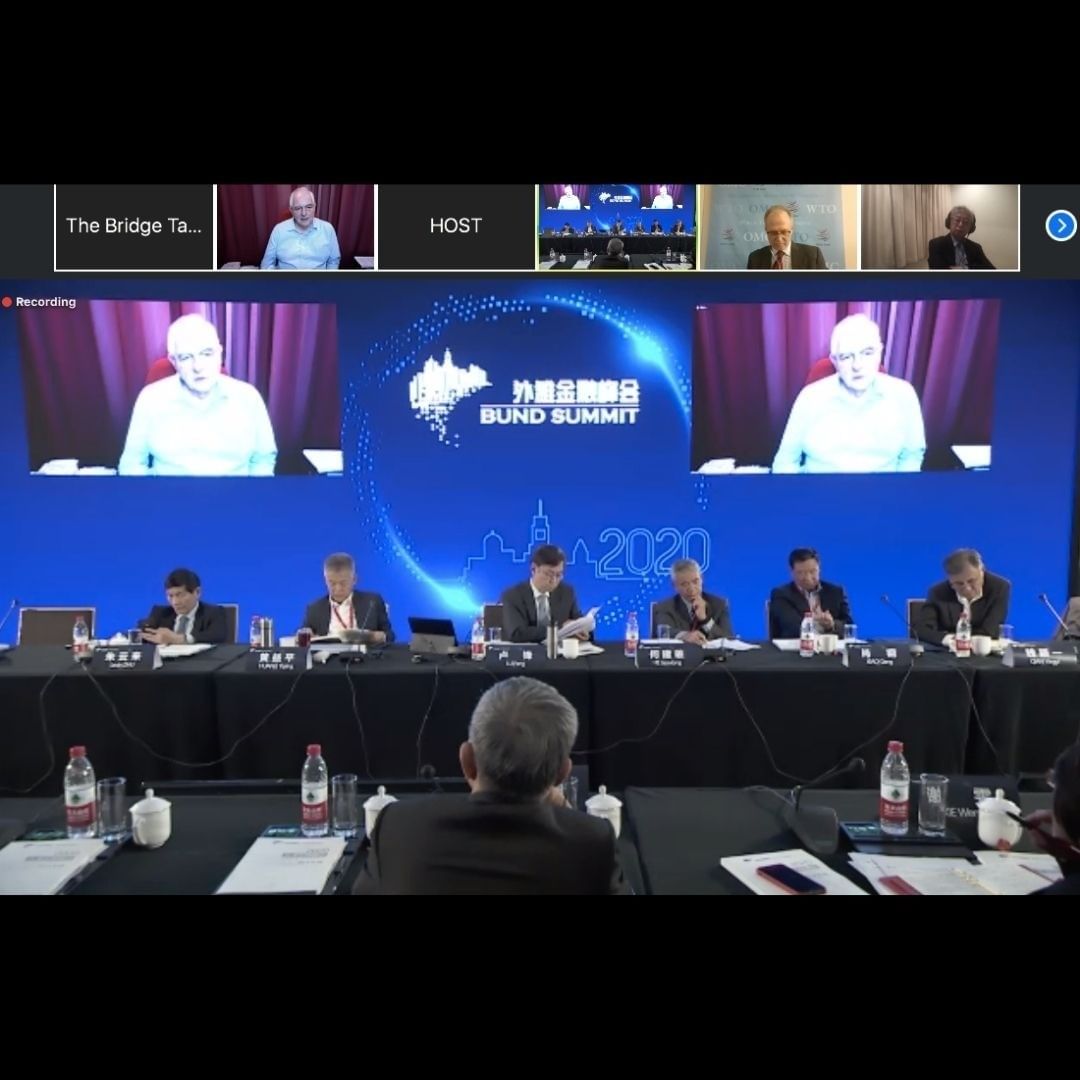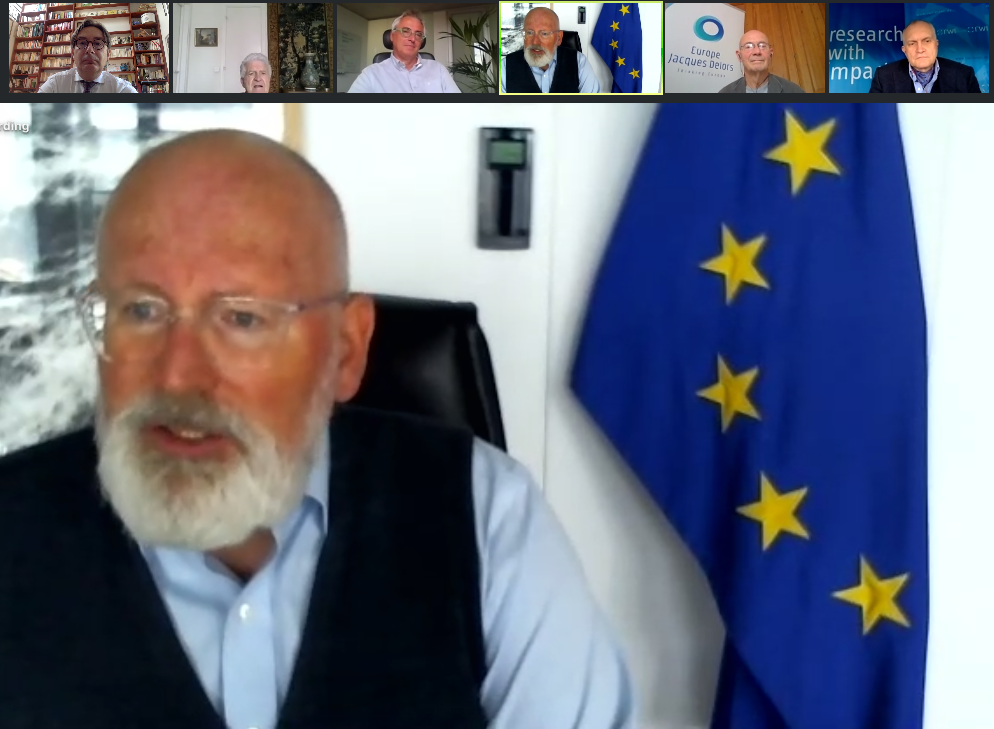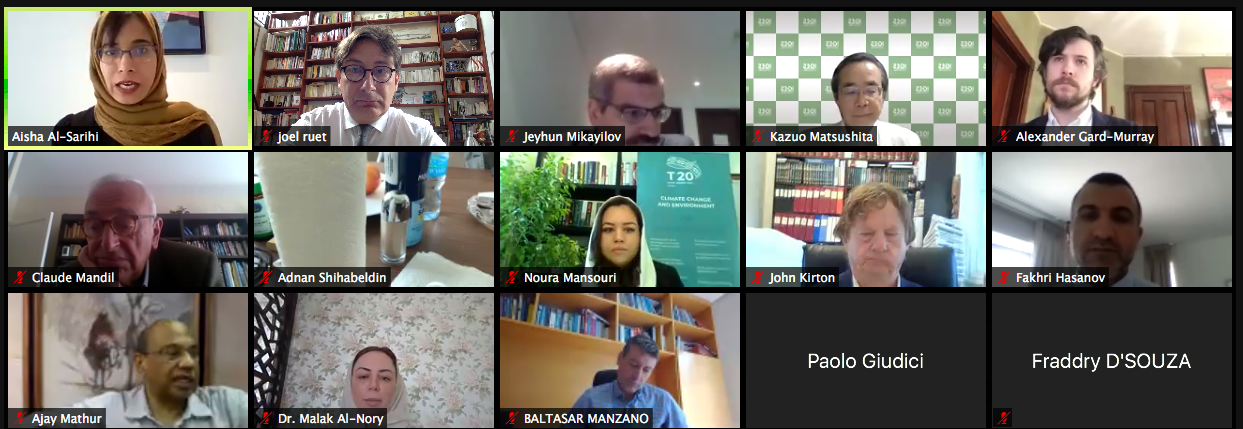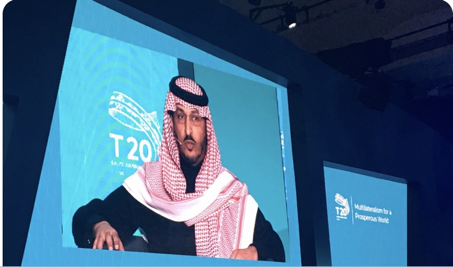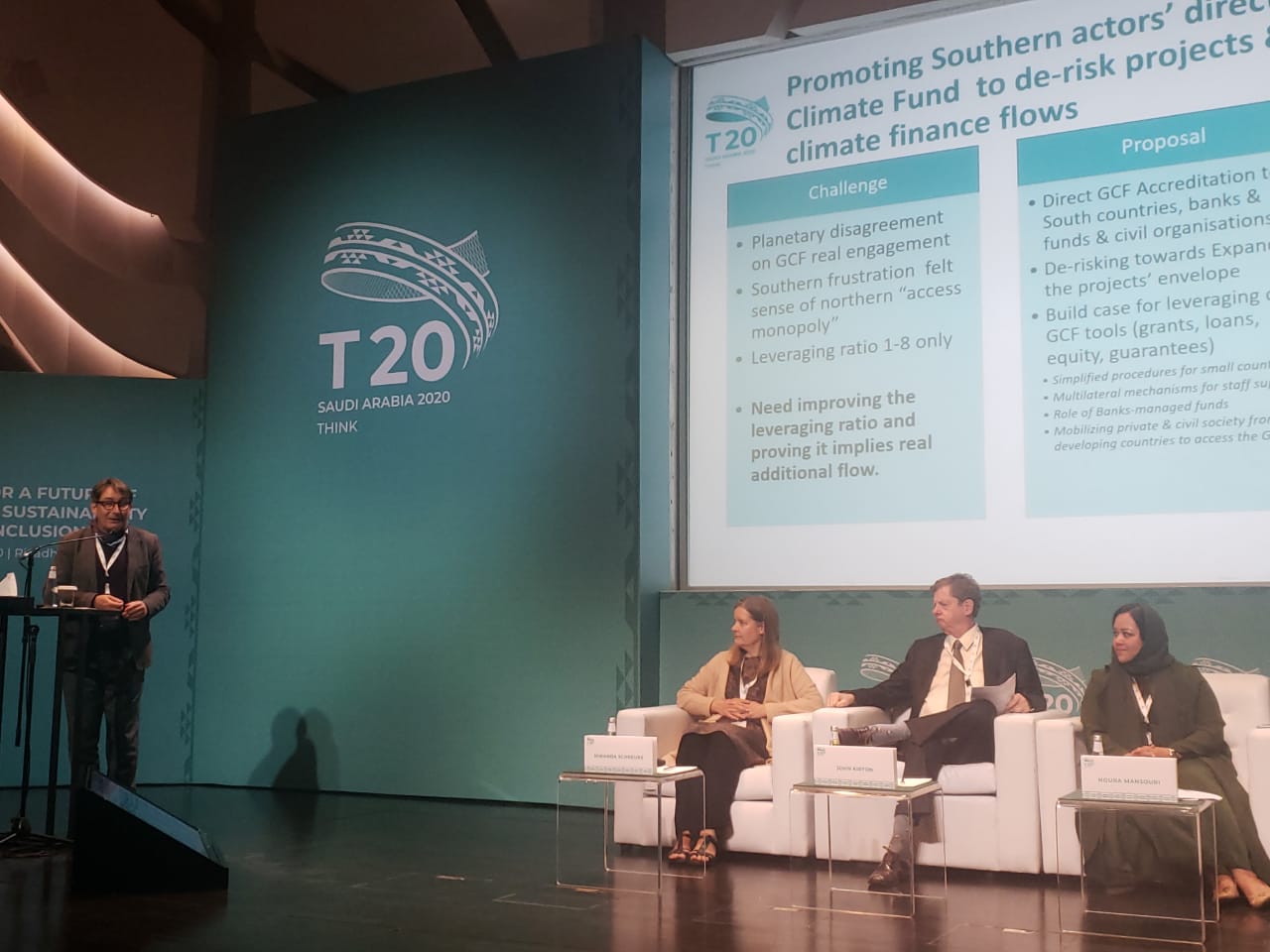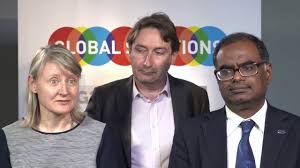Participation of the Bridge Tank in the Bund Summit 2020
Charlene Barshefsky, former United States Trade Representative, Lu Feng, Professor at the National School of Development of Peking University, Timothy Geithner, 75th Secretary of the Treasury of the United States, He Jianxiong, former Executive Director for China at the International Monetary Fund, Motoshige Itoh, Professor of International Social Sciences at Gakushuin University, Martin Wolf, Associate Editor and Chief Economics Commentator at the Financial Times, Robert Koopman, Chief Economist at the World Trade Organisation, and Jeff Schott, Senior Fellow at the Peterson Institute for International Economics, were among the keynote speakers of the Bund Summit Seminars. This event was divided into two seminars: “China-US relations and global response: trade and technology”, which was chaired by Lu Feng, and “Global asset allocation under the new normal”, which was moderated by Wang Haiming, Secretary-General of the Bund Summit Organising Committee and of the China Finance 40 Forum. The second seminar was divided into two panels, the first one dedicated to “Asset allocation and investment strategies under the new normal after the COVID-19 pandemic” and the second to “Further reform of the capital market and new opportunities for equity investment”.
The Bridge Tank was invited to attend this event, which took place on the 24th and the 25th of October 2020. Over 30 development and finance experts were gathered to intervene in these seminars.
Meeting of the Task Force on Fighting global warming in the EU through carbon pricing targeting, coupled with border adjustment mechanism
The Bridge Tank contributed to the Task Force on Carbon Pricing in Europe working group led by former French Minister of the Economy Edmond Alphandéry. With the support of Pascal Canfin, Chairman of the European Parliament’s Committee on the Environment, Public Health and Food Safety, it brought together ministers, members of the European Parliament, representatives of think tanks, academics, members of the business community, as well as European authorities and policy makers from various EU member states.
The enormous challenge to overcome the Covid-19 crisis should not hide the most disturbing phenomenon that awaits us: global warming. At European level, the “European climate law” which aims to achieve climate neutrality by 2050 rightly intends to create a “predictable business environment for industries and investors”. In this regard, this event will examine the introduction of carbon pricing targeting into the European emissions trading scheme. Targeting a predictable price of carbon over time in the ETS would eliminate its current volatility. This stable price environment for energy use decision-making would be a powerful incentive for companies to predictably reduce carbon emissions and thus stimulate investment in the energy transition. As such, this device would go a long way toward achieving the Green Deal’s “net zero greenhouse gas emissions” target. The meeting also explored the economic and social issues linked to the introduction of this measure and focused on the implementation of a carbon adjustment mechanism in the EU.
These proposals met with strong interest from European decision-makers, ranging from Frans Timmermans and Pascal Canfin to ministers from four countries, and personalities such as Pascal Lamy and Laurent Fabius.
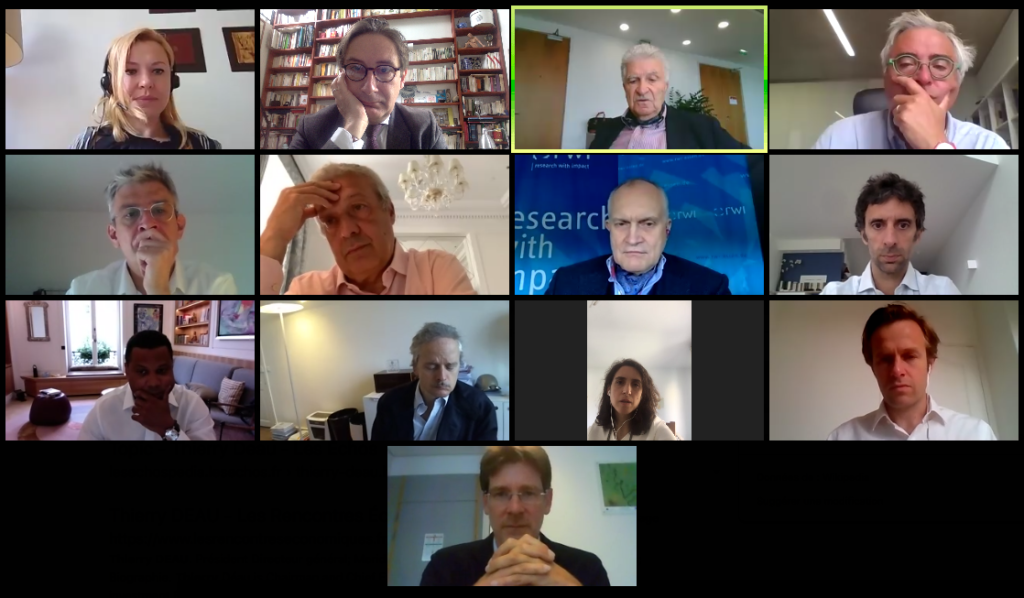
At the invitation of Edmond Alphandery, former Minister for the Economy, alongside Pascal Canfin (Chairman of the Committee on the Environment, Public Health and Food Safety of the European Parliament) and the former Minister for Italian finance Siniscalo – today VC at Morgan Stanley, including several European ministers and EU DGs, The Bridge Tank’s Joël Ruet & Bridge Tank Board Member Raphael Schoentgen contributed to the pan-European workshop on carbon prices in the framework of the EU ETS reform and the border adjustment mechanism, vouching for these ideas as a core tool without excluding bridge tools for certain energies being deployed such as hydrogen, and the possibility of transition support funds for technologies maturing or by the time the carbon price reached threshold values.
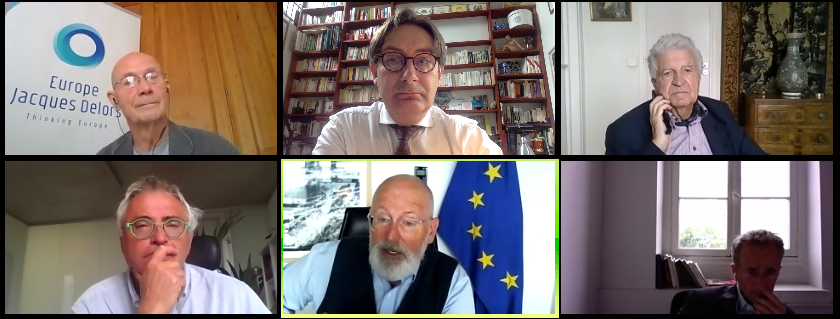
In a very direct discussion with Frans Timmermans, (Executive Vice-President of the European Commission), and the main economists of the Macron Committee on the Economy, and Pascal Lamy former Director General of the WTO on “The European Green Agreement and the role of carbon pricing”. Mr. Timmermans shared with us his optimism on new energies, on all the green industries that are accelerating today, including hydrogen, and for a tripling of the electrification of European energy and an exit from coal. He also shared his wish for an original European vision on energy voluntarism shared with Africa. A great moment of debate.

During the last session of this fantastic working group on the price of carbon set up by Edmond Alphandery, former Minister of the Economy, Jochen Flasbarth, Secretary of State for the Environment, for Nature Conservation, construction and nuclear safety at the German Federal Ministry, Leonore Gewessler, Austrian Federal Minister for Climate Action, the Environment, Energy, Mobility, Innovation and Technology, Hugo Morán, Spanish Secretary of State for the Environment, Brune Poirson, Secretary of State to the French Minister for the Ecological Transition, agreed that the EU should consider a carbon adjustment mechanism at the border, not as protectionist measure, but so as to foster economic modernisation and contribution to a local public good. Brune Poirson added the dimension of climate finance and social acceptance – France and Germany are aligned on this point.
Joël Ruet recalled the need to take into account the energy transformation opportunities in Southern Europe, a theme validated by Mr. Flasbarth and Ms. Gewessler, and discuss these matters in confidence with China and India, a key point of attention of The Bridge Tank.
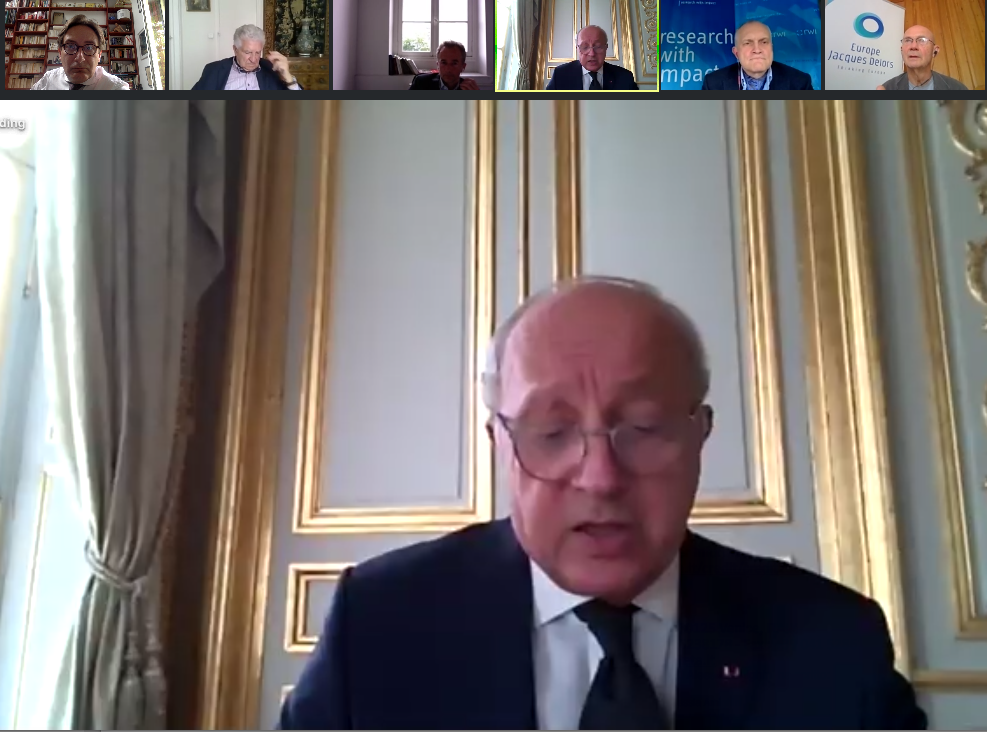
Former Prime Minister Laurent Fabius assessed the Paris Climate Agreement and the contribution that the new “EU team” can make to it: in a framework that must remain compatible with the WTO, ideas on carbon pricing and the adjustment of carbon prices at the borders are progressing. Mr. Fabius also pleaded for consultation or at least information with our partners, including India and China, a subject to which The Bridge Tank is attentive.
T20 Web Conference: Policy Recommendations for a Post-COVID-19 World
Joel Ruet presented the views of the Bridge Tank-convened working group on Promoting Southern actors’ direct access to the Green Climate Fund to de-risk projects and raise additional climate finance flows, written by Joël Ruet, Alessia Ameghini, Adel Ben Youssef, Ban Le, Celine Bak, Alexandre Borde, Paolo Giudici, Axel Michaelowa, Kang Rongping, Aman Srivastava, Leena Srivastava, Anbumozhi Venkatachalam.
Both the 2020-horizon USD 100 billion mobilization for climate and 2025 renewed target remain elusive. Climate negotiations are heading for a deadlock. The largest among multi-lateral climate funds, the Green Climate Fund, targets “greater paradigm-shifting mitigation and adaptation impact”. Structuring and scaling up climate financing implies to focus on differentiating between various risk appetites.

To encourage private additional flows, the G20 should support the GCF’s strategy of efficiently accrediting more Southern actors, becoming a facilitator of blended North-South-South public-private finance and an “educated risk-taking” Fund. This would defuse the climate negotiations crisis and accompany structuring climate finance.
In conversation – better sharing the dividends of growth
At G20 / T20, Saudi Deputy Minister of Finance said multilateral organizations have succeeded in ensuring efficiency but have failed in distribution – they “have focused on creating growth rather than sharing the fruits “
He planned pledges for multilateral stimulation to promote the national and common interests of the population – illustrating demographic transitions and employment in the South.
This is in this spirit ou Policy Brief wants to give ways for financial actors of the South directly accessing the Green Climate Fund.
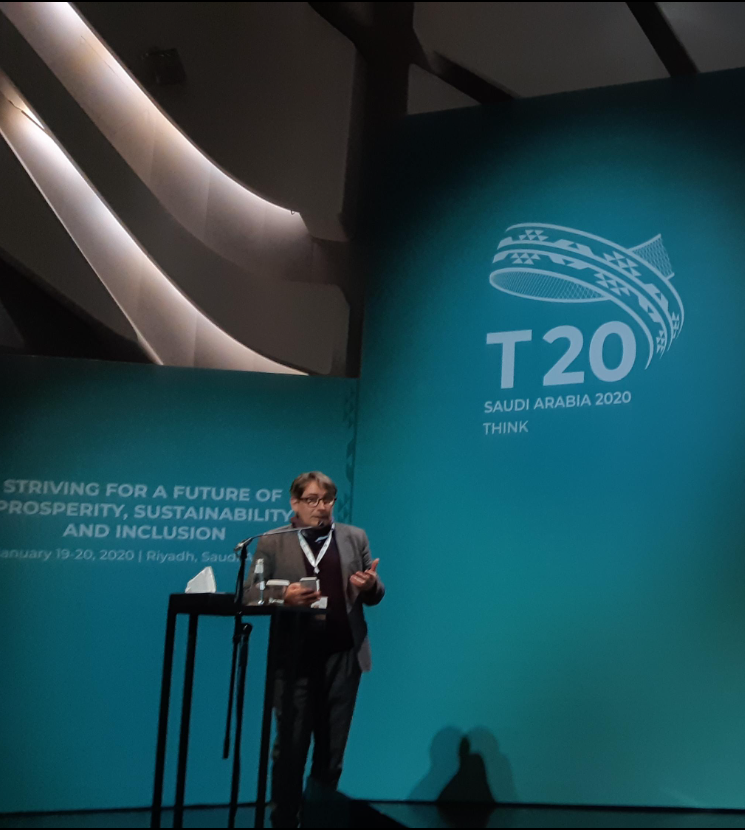
The Bridge Tank participated in the G20 / Think20 kick-off meeting in Riyadh
At this meeting we presented our ideas and plans for a policy brief to G20 leaders on increasing the financial envelope of the Green Climate Fund. The Brief will be directed by The Bridge Tank and involves contributors from Tunisia, China, India, Indonesia, Germany, Italy and France.
Over the past 5 years, we have contributed to the Task Force on “Climate change and finance” of the T20, and seen the exercise progress and deepen. When G20 leaders decide to unite, solutions are ready through engagement groups like the T20.
We received a warm welcome from the Saudi Arabian G20 presidency and the global T20 teams.
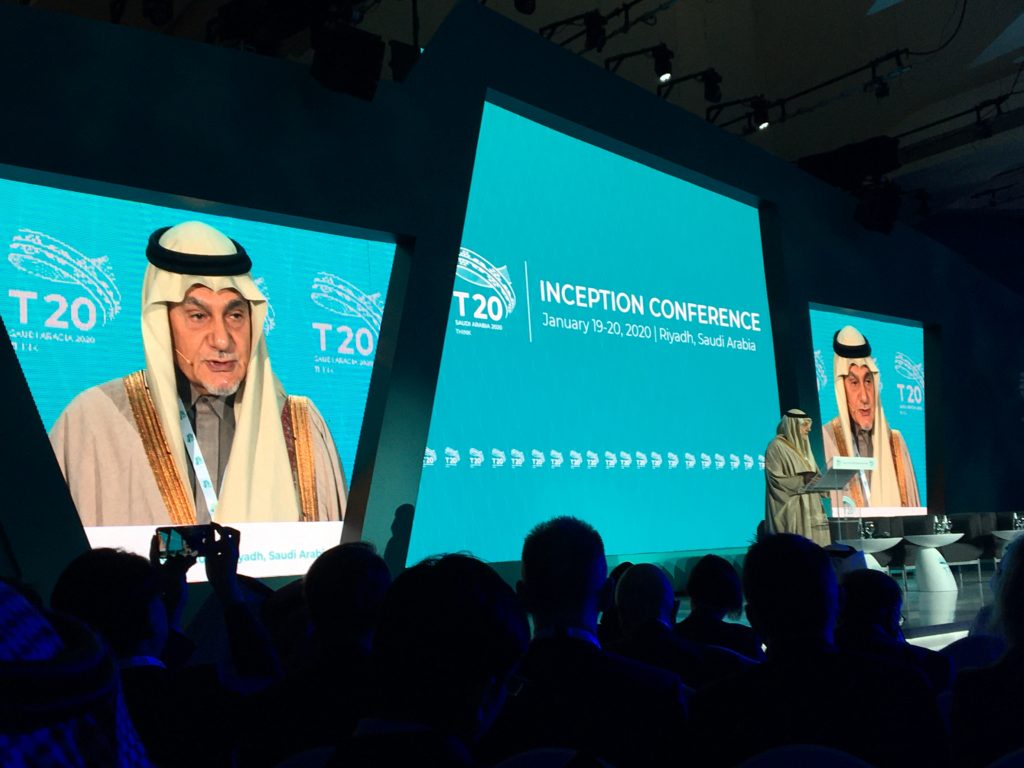
In the Plenary, HRH Prince Turki al Faycal bin Saud, long time head of Saudi intelligence, gave a keynote to Think20/G20 experts, encouraging us for innovative funding solutions, in line with our policy proposals on Green Climate Fund: fast direct access to southern countries, funds and NGOs.
Unlocking Finance: The Key Factor for Investment on Green Projects in Africa
A significant change in how investors approach green projects is underway. The fight against climate change requires and will require increases in the amount of capital being devoted to green projects. This underlines the importance of mobilizing financial actors from the private sector. Their awareness of this need and on the opportunities these investment give into re-defining the business, is already, for some of them, becoming a reality.
We now have the opportunity to move towards a “decarbonization“ of investment portfolios. For investment to match climate change mitigation goals, we will need concrete moves towards decarbonizing portfolios. The good news is that certain tools exist that can help make green projects more attractive to investors. This policy brief argues for renewed emphasis and action on these points to significantly boost investment. In other words, Africa is open for business.
Policy Brief : Soil as Natural Capital: a factor for sustainable diversification
The soil is a living ecosystem that is capable of growth and diversification. It is also a productive capital but the conventional methods and technologies of its exploitation could lead to its destruction. Reversing this paradigm is the basis of a green growth strategy: the soil can become a carbon sink again, and the material and energy it produces can fuel genuinely sustainable industries, especially mobility. As a capital, the soil is not irremediably degraded; Sustainable management of soil capital is hence a priority for sustainable diversification and climate.
Tribune: To finance the COP21 promise, Europe must establish a carbon tax on imports
In the wake of the COP21, August 5, 2018, The Bridge Tank: Philippe Coste, Hakima El Haite, our board members and Joël Ruet, our President, wrote an opinion piece with climate policy specialist Axel Michaelowa on the need to establish a carbon tax on imports.
Read the article (in French) here
T20/G20 Policy Brief : Innovative Green-Technology SMEs as an Opportunity to Promote Financial De-Risking
By Joël Ruet(The Bridge Tank and CNRS-CEPN), Elena Verdolini(FEEM and CMCC), Céline Bak(CIGI and Analytica Advisors), Anbumozhi Venkatachalam(ERIA)
“We recommend that the G20 target innovative green-technology SMEs as an opportunity to promote financial de-risking while addressing Paris Agreement commitments and UN Sustainable Development Goals. This should be achieved by creating signals for private investors through: (1) a reporting system that can help monitor the scale-up of green-technology SMEs; (2) the use of public funds to signal innovative green-technology SMEs to investors; and (3) the inclusion of SMEs in the design of green finance platforms. By implementing these recommendations, the G20 will ensure that innovative, low- carbon SMEs become attractive, low(er)-risk investment opportunities for the private sector.” Read more …

